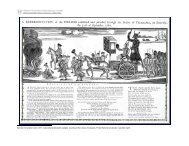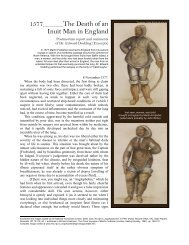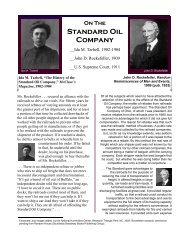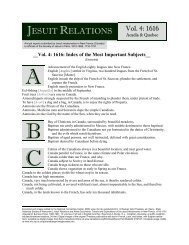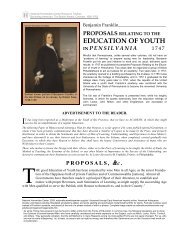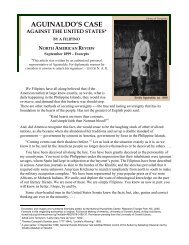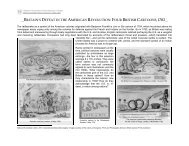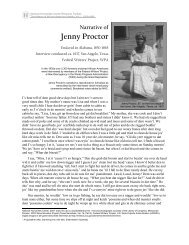Slaves' Resistance on Southern Plantations, Selections from the ...
Slaves' Resistance on Southern Plantations, Selections from the ...
Slaves' Resistance on Southern Plantations, Selections from the ...
Create successful ePaper yourself
Turn your PDF publications into a flip-book with our unique Google optimized e-Paper software.
Nati<strong>on</strong>al Humanities Center Resource Toolbox<br />
The Making of African American Identity: Vol. I, 1500-1865<br />
SLAVES’ RESISTANCE<br />
<strong>on</strong> <strong>Sou<strong>the</strong>rn</strong> Plantati<strong>on</strong>s<br />
* Selecti<strong>on</strong>s <strong>from</strong> <strong>the</strong> WPA Slave Narratives<br />
Over 2300 former slaves were interviewed during <strong>the</strong> Great Depressi<strong>on</strong> of <strong>the</strong> 1930s by<br />
members of <strong>the</strong> Federal Writers' Project, a New Deal agency in <strong>the</strong> Works Progress<br />
Administrati<strong>on</strong> (WPA). Many recount acts of resistance ⎯ direct and indirect ⎯ performed<br />
despite <strong>the</strong> risk of severe punishment. Praying for strength was an act of resistance in<br />
itself, explains Delia Garlic. “We didn’t ’spect nothin’ but to stay in b<strong>on</strong>dage ’till we died.”<br />
Note: Selecti<strong>on</strong>s <strong>from</strong> <strong>the</strong> narratives are presented as transcribed. Black interviewees<br />
often referred to <strong>the</strong>m-selves with terms that in some uses are c<strong>on</strong>sidered offensive.<br />
Some white interviewers, despite project guidelines for transcribing <strong>the</strong> narratives, used<br />
stereotypical patterns of representing black speech. See “A Note <strong>on</strong> <strong>the</strong> Language of <strong>the</strong><br />
Narratives” at lcweb2.loc.gov/ammem/snhtml/snlang.html and “Guidelines for Interviewers”<br />
at nati<strong>on</strong>al humanitiescenter.org/pds/maai/wpanarrsuggesti<strong>on</strong>s.pdf.<br />
One day I remembers my bro<strong>the</strong>r, January, was cotched ober<br />
[caught over] seein’ a gal <strong>on</strong> de next plantati<strong>on</strong>. He had a pass but<br />
de time <strong>on</strong> it d<strong>on</strong>e gib out. Well suh, when de massa found out dat he<br />
wuz a hour late, he got as mad as a hive of bees. So when bro<strong>the</strong>r<br />
January he come home, de massa took down his l<strong>on</strong>g mule skinner 1 and<br />
tied him wid a rope to a pine tree. He strip’ his shirt off and said:<br />
“Now, nigger, I’m goin’ to teach you some sense.”<br />
Wid dat he started layin’ <strong>on</strong> de lashes. January was a big, fine<br />
lookin’ nigger: de finest I ever seed. He wuz jus’ four years older dan<br />
me, an’ when de massa begin a beatin’ him, January neber said a word.<br />
De massa got madder and madder kaze [because] he couldn’t make<br />
January holla.<br />
“What’s de matter wid you, nigger?” he say. “D<strong>on</strong>’t it hurt?”<br />
January, he neber said nothin’, and de massa keep a beatin’ till little<br />
streams of blood started flowin’ down January’s chest, but he neber<br />
holler. His lips wuz a quiverin’ and his body wuz a shakin’, but his<br />
mouf it neber open; and all de while I sat <strong>on</strong> my mammy’s and pappy’s<br />
steps a cryin’. De niggers wuz all ga<strong>the</strong>red about an some uv ’em<br />
couldn’t stand it; dey hadda go inside dere cabins. Atter while, January,<br />
he couldn’t stand it no l<strong>on</strong>ger hisself, and he say in a hoarse, loud<br />
whisper:<br />
“Massa! Massa! have mercy <strong>on</strong> dis poor nigger.”<br />
William Colbert, enslaved in Georgia <br />
Sometimes a stripped Nigger would say some hard things to <strong>the</strong><br />
white man with <strong>the</strong> strap in his hand, though he knew that he (<strong>the</strong><br />
Negro) would pay for it dearly, for when a slave showed spirit that way<br />
<strong>the</strong> master or overseer laid <strong>the</strong> lash <strong>on</strong> all <strong>the</strong> harder.<br />
W. B. Allen, enslaved in Alabama <br />
“January neber said a word”<br />
William Colbert, 1937<br />
“I give up for dead”<br />
Sarah Douglas (with her<br />
husband), ca. 1937<br />
*<br />
Nati<strong>on</strong>al Humanities Center, 2007: nati<strong>on</strong>alhumanitiescenter.org/pds/. Text and photographs of interviewees courtesy of <strong>the</strong> Library of C<strong>on</strong>gress, Manuscript<br />
Divisi<strong>on</strong>: WPA Slave Narrative Project, Federal Writers’ Project, U.S. Work Projects Administrati<strong>on</strong> (USWPA). Digital images of all typed<br />
transcribed interviews at memory.loc.gov/ammem/snhtml/snhome.html. Bracketed comments added by NHC; paren<strong>the</strong>tical comments in original. A few<br />
typographical errors corrected by NHC when necessary for clarity. Complete image credits at nati<strong>on</strong>alhumanitiescenter.org/pds/maai/imagecredits.htm.<br />
1<br />
January Colbert was <strong>the</strong> mule driver (“mule skinner”) <strong>on</strong> <strong>the</strong> plantati<strong>on</strong>.
We was scart of Solom<strong>on</strong> and his whip, though, and he didn’t like<br />
frolickin’. He didn’t like for us niggers to pray, ei<strong>the</strong>r. We never heard<br />
of no church, but us have prayin’ in <strong>the</strong> cabins. We’d set <strong>on</strong> <strong>the</strong> floor and<br />
pray with our head down low and sing low, but if Solom<strong>on</strong> heared he’d<br />
come and beat <strong>on</strong> <strong>the</strong> wall with <strong>the</strong> stock of his whip. He’d say, “I’ll come in<br />
<strong>the</strong>re and tear <strong>the</strong> hide off you backs.” But some <strong>the</strong> old niggers tell us we<br />
got to pray to Gawd that he d<strong>on</strong>’t think different of <strong>the</strong> blacks and <strong>the</strong><br />
whites. I know that Solom<strong>on</strong> is burnin’ in hell today, and it pleasures me to<br />
know it.<br />
Mary Reynolds, enslaved in Louisiana <br />
When we prayed by ourse’ves we daren’t let <strong>the</strong> white folks know it and<br />
we turned a wash pot down to <strong>the</strong> ground to cotch <strong>the</strong> voice. We prayed<br />
a lot to be free and <strong>the</strong> Lord d<strong>on</strong>e heered us. We didn’t have no s<strong>on</strong>g books<br />
and <strong>the</strong> Lord d<strong>on</strong>e give us our s<strong>on</strong>gs and when we sing <strong>the</strong>m at night it jus’<br />
whispering so nobody hear us. One went like this:<br />
“My knee b<strong>on</strong>es am aching,<br />
My body’s rackin’ with pain,<br />
I ’lieve I’m a chile of God,<br />
And this ain’t my home,<br />
’Cause Heaven’s my aim.”<br />
Anders<strong>on</strong> Edwards, enslaved in Texas <br />
We slips off and have prayer but daren’t ’low [allow] <strong>the</strong> white folks<br />
know it and sometimes we hums ’ligious s<strong>on</strong>gs low like when we’s<br />
workin’. It was our way of prayin’ to be free, but <strong>the</strong> white folks didn’t<br />
know it.<br />
Millie Ann Smith, enslaved in Texas <br />
I tell you chile, it was pitiful, but God did not let it last always. I have<br />
heard slaves morning and night pray for deliverance. Some of ’em<br />
would stand up in de fields or bend over cott<strong>on</strong> and corn and pray out loud<br />
for God to help ’em and in time you see, He did.<br />
Clayborn Gantling, enslaved in Georgia <br />
Jus’ fore de war, a white preacher he come to us slaves and says: “Do<br />
you wan’ to keep you homes whar you git all to eat, and raise your<br />
chillen, or do you wan’ to be free to roam roun’ without a home, like de wil’<br />
animals? If you wan’ to keep you homes you better pray for de South to win.<br />
All day wan’s to pray for de South to win, raise <strong>the</strong> hand.” We all raised our<br />
hands ’cause we was skeered not to, but we sho’ didn’ wan’ de South to win.<br />
Dat night all de slaves had a meetin’ down in de hollow. Ole Uncle<br />
Mack, he gits up and says: “One time over in Viginny dere was two ole<br />
niggers, Uncle Bob and Uncle Tom. Dey was mad at <strong>on</strong>e ’nu<strong>the</strong>r and <strong>on</strong>e<br />
day dey decided to have a dinner and bury de hatchet. So dey sat down, and<br />
when Uncle Bob wasn’t lookin’ Uncle Tom put some pois<strong>on</strong> in Uncle Bob’s<br />
food, but he saw it and when Uncle Tom wasn’t lookin’, Uncle Bob he<br />
turned de tray roun’ <strong>on</strong> Uncle Tom, and he gits de pois<strong>on</strong> food. “Uncle<br />
Mack,” he says: “Dat’s what we slaves is gwine [going to] do, jus’ turn de<br />
tray roun’ and pray for de North to win.”<br />
William M. Adams, enslaved in Texas <br />
Anders<strong>on</strong> Edwards, ca. 1937<br />
Millie Ann Smith, ca. 1937<br />
Nati<strong>on</strong>al Humanities Center 2
One reas<strong>on</strong> Marse Morgan thought so much o’ me, dey say I was a right pert young’n an’ caught <strong>on</strong><br />
to anything pretty quick. Marster would tell me, “Loosanna, if you keep yo’ ears open an’ tell me<br />
what de darkies talk ’bout, dey’ll be somp’n’ good in it for you.” (He meant for me to listen when dey’d<br />
talk ’bout runnin’ off an’ such.) I’d stay ’roun’ de old folks an’ make lak I was a-playin’. All de time I’d<br />
be a-listenin’. Den I’d go an’ tell Marster what I hear’d. But all de time I mus’ a-had a right smart mind,<br />
’cause I’d play ’roun’ de white folks an’ hear what dey’d say an’ den go tell de Niggers. D<strong>on</strong>’t guess de<br />
marster ever thought ’bout me doin’ dat.<br />
Anna Baker, enslaved in Alabama <br />
It seems like this overseer was of <strong>the</strong> meanest kind, always whipping <strong>the</strong> slaves for no reas<strong>on</strong> at all,<br />
and <strong>the</strong> slaves tried to figure out a way to even up with him by chasing him off <strong>the</strong> place.<br />
One of <strong>the</strong> slaves told how to cure him. Get a King snake and put <strong>the</strong> snake in <strong>the</strong> overseer’s cabin.<br />
Slip <strong>the</strong> snake in about, no, not about, but just exactly nine o’clock at night. Seems like <strong>the</strong> time was<br />
important, why so, I d<strong>on</strong>’t remember now.<br />
That’s what <strong>the</strong> slaves did. Put in <strong>the</strong> snake and out went <strong>the</strong> overseer. Never no more did he whip <strong>the</strong><br />
slaves <strong>on</strong> that plantati<strong>on</strong> because he wasn’t working <strong>the</strong>re no more! When he went, where he went, or<br />
how he went nobody knows, but <strong>the</strong>y all say he went. That’s what counted ⎯ he was g<strong>on</strong>e!<br />
Mattie Logan, enslaved in Mississippi <br />
You see, my mamma bel<strong>on</strong>g to old William Cleveland and old<br />
Polly Cleveland, and <strong>the</strong>y was <strong>the</strong> meanest two white folks what<br />
ever lived, ’cause <strong>the</strong>y was allus beatin’ <strong>on</strong> <strong>the</strong>ir slaves. . . [Polly]<br />
whipped my little sister what was <strong>on</strong>ly nine m<strong>on</strong>ths old and jes’ a baby<br />
to death. She come and took <strong>the</strong> diaper offen my little sister and<br />
whipped till <strong>the</strong> blood jes’ ran ⎯ jes’ ’cause she cry like all babies do,<br />
and it kilt my sister. I never forgot that, but I got some even with that<br />
old Polly devil and it’s this-a-way.<br />
You see, I’s ’bout 10 year old and I bel<strong>on</strong>gs to Miss Olivia, what<br />
was that old Polly’s daughter, and <strong>on</strong>e day old Polly devil comes to<br />
where Miss Olivia lives after she marries, and trys to give me a lick out<br />
in <strong>the</strong> yard, and I picks up a rock ’bout as big as half your fist and hits<br />
her right in <strong>the</strong> eye and busted <strong>the</strong> eyeball, and tells her that’s for<br />
whippin’ my baby sister to death. You could hear her holler for five<br />
miles, but Miss Olivia, when I tells her, says, “Well I guess mamma has<br />
larnt her less<strong>on</strong> at last.” But that old Polly was mean like her husban’,<br />
old Cleveland, till she die, and I hopes <strong>the</strong>y is burnin’ in torment now.<br />
Mary Armstr<strong>on</strong>g, enslaved in Missouri <br />
My poppa was str<strong>on</strong>g. He never had a lick in his life. He helped <strong>the</strong><br />
marster, but <strong>on</strong>e day <strong>the</strong> marster says, “Si, you got to have a<br />
whoppin’,” and my poppa says, “I never had a whoppin’ and you cain’t<br />
whop me.” An’ <strong>the</strong> marster says, “But I kin kill you,” an’ he shot my<br />
poppa down. My mama tuk him in <strong>the</strong> cabin and put him <strong>on</strong> a pallet. He<br />
died.<br />
Anne Clark, enslaved in Mississippi and Tennessee <br />
Hugh White wuz so mean to his slaves that I know of two gals that<br />
killt <strong>the</strong>mselfs. One nigger gal Sudie wuz found across <strong>the</strong> bed with<br />
a pen knife in her hand. He whipped ano<strong>the</strong>r nigger gal most to death for<br />
fergiting to put <strong>on</strong>i<strong>on</strong>s in <strong>the</strong> stew. The next day she went down to <strong>the</strong><br />
river and fer nine days <strong>the</strong>y searched fer her and her body finally<br />
Mary Armstr<strong>on</strong>g, ca. 1937<br />
Anne Clark, ca. 1937<br />
Nati<strong>on</strong>al Humanities Center 3
washed up<strong>on</strong> <strong>the</strong> shore. The master could never live in that house again as when he would go to sleep he<br />
would see <strong>the</strong> nigger standing over his bed. Then he moved to Richm<strong>on</strong>d and <strong>the</strong>re he stayed until a little<br />
later when he hung himself.<br />
Sophia Word, enslaved in Kentucky <br />
Aunt Adeline . . . hung herself <strong>on</strong> a black jack tree <strong>on</strong> <strong>the</strong> o<strong>the</strong>r side of <strong>the</strong> pool. It was a pool for<br />
ducks and stock.<br />
She hung herself to keep <strong>from</strong> getting a whooping. Mo<strong>the</strong>r raised (reared) her boy. She told mo<strong>the</strong>r<br />
she would kill herself before she would be whooped. I never heard what she was to be whooped for. She<br />
thought she would be whooped. She took a rope and tied it to a limb and to her neck and <strong>the</strong>n jumped.<br />
Her toes barely touched <strong>the</strong> ground. They buried her in <strong>the</strong> cemetery <strong>on</strong> <strong>the</strong> old Ed Cott<strong>on</strong> place. I never<br />
seen her buried.<br />
T. W. Cott<strong>on</strong>, enslaved in Arkansas <br />
My mo<strong>the</strong>r told me that he [<strong>the</strong> master] owned a woman who was <strong>the</strong> mo<strong>the</strong>r of several chillun and<br />
when her babies would get about a year or two of age he’d sell <strong>the</strong>m and it would break her heart. She<br />
never got to keep <strong>the</strong>m. When her fourth baby was born and was about two m<strong>on</strong>ths old she just studied all<br />
<strong>the</strong> time about how she would have to give it up and <strong>on</strong>e day she said,<br />
“I just decided I’m not going to let old Master sell this baby; he just<br />
ain’t going to do it.” She got up and give it something out of a bottle<br />
and purty so<strong>on</strong> it was dead. ’Course didn’t nobody tell <strong>on</strong> her or he’d of<br />
beat her nearly to death.<br />
Lou Smith, enslaved in Mississippi <br />
I has thought many times through all dese years how mammy<br />
looked dat night [Garlic was taken away to be sold]. She pressed<br />
my han’ in bofe of hers an’ said “Be good an’ trus’ in de Lawd.”<br />
Trustin’ was de <strong>on</strong>ly hope of de pore black critters in dem days. Us<br />
jest prayed fer strength to endure it to de end. We didn’t ’spect nothin’<br />
but to stay in b<strong>on</strong>dage ’till we died.<br />
Delia Garlic, enslaved in Virginia <br />
I wuz <strong>on</strong>e slave dat de poor white man had his match. See Miss<br />
Sue? [interviewer] Dese here ol’ white men said, “what I can’t do<br />
by fair means I’ll do by foul.” One tried to throw me, but he couldn’t.<br />
We tusseled an’ knocked over chairs an’ when I got a grip I scratched<br />
his face all to pieces; an dar wuz no more bo<strong>the</strong>ring Fannie <strong>from</strong> him;<br />
but oh, h<strong>on</strong>ey, some slaves would be beat up so, when dey resisted, an’<br />
sometimes if you’ll ’belled [rebelled] de overseer would kill yo’. Us<br />
Colored women had to go through a plenty, I tell you.<br />
Fannie Berry, enslaved in Virginia <br />
Plenty of <strong>the</strong> colored women have children by <strong>the</strong> white men. She<br />
know better than to not do what he say. Didn’t have much of that<br />
until <strong>the</strong> men <strong>from</strong> South Carolina come up here and settle and bring<br />
slaves. Then <strong>the</strong>y take <strong>the</strong>m very same children what have <strong>the</strong>y own<br />
blood and make slaves out of <strong>the</strong>m. If <strong>the</strong> Missus find out she raise<br />
revoluti<strong>on</strong>. But she hardly find out. The white men not going to tell and<br />
<strong>the</strong> nigger women were always afraid to. So <strong>the</strong>y jes go <strong>on</strong> hopin’ that<br />
things w<strong>on</strong>’t be that way always.<br />
W. L. Bost, enslaved in North Carolina <br />
Delia Garlic, ca. 1937<br />
W. L. Bost, ca. 1937<br />
Nati<strong>on</strong>al Humanities Center 4
The master who owned her [Jordan’s mo<strong>the</strong>r] before Mister Clark was <strong>on</strong>e of <strong>the</strong>m white mens who<br />
was always whipping and beating his slaves and mammy couldn’t stand it no more.<br />
That’s <strong>the</strong> way she tells me about it. She just figured she would be better off dead and out of her<br />
misery as to be whipped all <strong>the</strong> time, so <strong>on</strong>e day <strong>the</strong> master claimed <strong>the</strong>y was something wr<strong>on</strong>g with her<br />
work and started to raise his whip, but mammy fought back and when <strong>the</strong> ruckus was over <strong>the</strong> Master was<br />
laying still <strong>on</strong> <strong>the</strong> ground and folks thought he was dead, he got such a heavy beating.<br />
Mammy says he d<strong>on</strong>’t die and right after that she was sold to Mister Clark I been telling you about.<br />
And mammy was full of misery for a l<strong>on</strong>g time after she was carried to Mark Lowery’s plantati<strong>on</strong> where<br />
at I was born during <strong>the</strong> War.<br />
Josie Jordan, enslaved in Tennessee <br />
The last whipping old miss give me she tied me to a tree and oh my Lord! old miss whipped me that<br />
day. That was <strong>the</strong> worse whipping I ever got in my life. I cried and bucked and hollered until I<br />
couldn’t. I give up for dead and she wouldn’t stop. I stop crying and said to her, “Old miss, if I were you<br />
and you were me I wouldn’t beat you this way.” That struck old miss’s heart and she let me go and she<br />
did not have <strong>the</strong> heart to beat me any more.<br />
Sarah Douglas, enslaved in Alabama <br />
Did you every stop to think that thinking d<strong>on</strong>’t do any good when<br />
you do it too late? Well, that’s how it was with us. If every<br />
mo<strong>the</strong>r’s s<strong>on</strong> of a black had thrown ’way his hoe and took up a gun to<br />
fight for his own freedom al<strong>on</strong>g with <strong>the</strong> Yankees, <strong>the</strong> war’d been over<br />
before it began. But we didn’t do it. We couldn’t help stick to our<br />
masters. We couldn’t no more shoot ’em than we could fly. My fa<strong>the</strong>r<br />
and me used to talk ’bout it.<br />
Felix Haywood, enslaved in Texas <br />
Master Brown’s boy and I were <strong>the</strong> same age you see (14 years old)<br />
and he would send me to school to protect his kids, and I would<br />
have to sit up <strong>the</strong>re until school was out. So while sitting <strong>the</strong>re I<br />
listened to what <strong>the</strong> white teacher was telling <strong>the</strong> kids, and caught <strong>on</strong><br />
how to read, write and figger ⎯ but I never let <strong>on</strong>, ’cause if I was<br />
caught trying to read or figger dey would whip me something terrible.<br />
After I caught <strong>on</strong> how to figger <strong>the</strong> white kids would ask me to teach<br />
<strong>the</strong>m.<br />
Hal Huts<strong>on</strong>, enslaved in Tennessee <br />
I have no educati<strong>on</strong>. I can nei<strong>the</strong>r read nor write. As a slave I was<br />
Felix Haywood, ca. 1937<br />
not allowed to have books. On Sundays I would go into <strong>the</strong> woods<br />
and ga<strong>the</strong>r ginseng which I would sell to <strong>the</strong> doctors for <strong>from</strong> 10¢ to<br />
15¢ a pound and with this m<strong>on</strong>ey I would buy a book that was called <strong>the</strong> Blue Back Speller. Our master<br />
would not allow us to have any books and when we were lucky enough to own a book we would have to<br />
keep it hid, for if our master would find us with a book he would whip us and take <strong>the</strong> book <strong>from</strong> us.<br />
After receiving three severe whippings I gave up and never again tried for any learning, and to this day I<br />
can nei<strong>the</strong>r read not write.<br />
George Thomps<strong>on</strong>, enslaved in Kentucky <br />
If you didn’t git better rati<strong>on</strong>s and things to eat in de house, it was your own fault, I tells you! You<br />
just have to help de chillun to take things and while you doin’ dat for <strong>the</strong>m, you take things for<br />
yourself. I never call it stealin’. I just call it takin’ de jams, de jellies, de biscuits, de butter and de ’lasses<br />
[molasses] dat I have to reach up and steal for <strong>the</strong>m chillun to hide ’way in deir little stomaches, and me,<br />
in my big belly.<br />
Mary Raines, enslaved in South Carolina <br />
Nati<strong>on</strong>al Humanities Center 5
Carter J. Jacks<strong>on</strong>, ca. 1937<br />
I used to steal some chickens, ’cause we didn’t have ’nough to eat, and I<br />
d<strong>on</strong>’ think I d<strong>on</strong>e wr<strong>on</strong>g, ’cause <strong>the</strong> place was full of ’em. We sho’<br />
earned what we et. I’d go up to <strong>the</strong> big house to make fires and lots of times<br />
I seed <strong>the</strong> mantel board lined with greenbacks, ’tween mantel and wall and<br />
I’s snitched many a $50.00 bill, but it [C<strong>on</strong>]’federate m<strong>on</strong>ey.<br />
Carter J. Jacks<strong>on</strong>, enslaved in Alabama and Texas <br />
he’s afraid to eat it hisself account of <strong>the</strong> hogs got malitis.<br />
Some of <strong>the</strong>m slaves was so poorly thin <strong>the</strong>y ribs would kinder rustle<br />
against each o<strong>the</strong>r like corn stalks a-drying in <strong>the</strong> hot winds. But <strong>the</strong>y<br />
gets even <strong>on</strong>e hog-killing time, and it was funny too, mammy said.<br />
They was seven hogs, fat and ready for fall hog-killing time. Just <strong>the</strong><br />
day before old master told off <strong>the</strong>y was to be killed, something happened to<br />
all <strong>the</strong>m porkers. One of <strong>the</strong> field boys found <strong>the</strong>m and come a-telling <strong>the</strong><br />
master: “The hogs is all died, now <strong>the</strong>y w<strong>on</strong>’t be any meats for <strong>the</strong> winter.”<br />
When <strong>the</strong> master gets to where at <strong>the</strong> hogs is laying, <strong>the</strong>y’s a lot of<br />
Negroes standing round looking sorrow-eyed at <strong>the</strong> wasted meat. The<br />
master asks: “What’s <strong>the</strong> illness with ’em?”<br />
“Malitis.” They tell him, and <strong>the</strong>y acts like <strong>the</strong>y d<strong>on</strong>’t want to touch <strong>the</strong><br />
hogs. Master says to dress [prepare] <strong>the</strong>m anyway for <strong>the</strong>y ain’t no more<br />
meat <strong>on</strong> <strong>the</strong> place.<br />
He says to keep all <strong>the</strong> meat for <strong>the</strong> slave families, but that’s because<br />
“D<strong>on</strong>’t you-all know what is malitis?” Mammy would ask <strong>the</strong> children when she was telling of <strong>the</strong><br />
seven fat hogs and seventy lean slaves. And she would laugh, remembering how <strong>the</strong>y fooled <strong>the</strong> old<br />
master so’s to get all <strong>the</strong>m good meats.<br />
“One of <strong>the</strong> str<strong>on</strong>gest Negroes got up early in <strong>the</strong> morning,” Mammy would explain, “’l<strong>on</strong>g ’fore <strong>the</strong><br />
rising horn called <strong>the</strong> slaves <strong>from</strong> <strong>the</strong>ir cabins. He skitted to <strong>the</strong> hog pen with a heavy mallet in his hand.<br />
When he tapped Mister Hog ’tween <strong>the</strong> eyes with that mallet, ‘malitis’ set in mighty quick, but it was a<br />
uncomm<strong>on</strong> ‘disease,’ even with hungry Negroes around all <strong>the</strong> time.” Josie Jordan, enslaved in Tennessee <br />
Us got provisi<strong>on</strong>s ’lowanced to us every Saturday night. If you had two in <strong>the</strong> family, <strong>the</strong>y ’lowanced<br />
you <strong>on</strong>e-half gall<strong>on</strong> ’lasses [molasses] and 12 to 15 pounds bac<strong>on</strong> and a peck of meal. We have to<br />
take <strong>the</strong> meal and parch it and make coffee out of it. We had our flours. One of <strong>the</strong>m we called biscuit<br />
flour and we called it “shorts.” We had rye and wheat and buck grain.<br />
If <strong>the</strong>y didn’t provisi<strong>on</strong> you ’nough, you jus’ had to slip ’round and git a chicken. That easy ’nough,<br />
but grabbin’ a pig a sho’ ’nough problem. You have to cotch him by <strong>the</strong> snoot so he w<strong>on</strong>’t squeal, and<br />
clomp him tight while you knife him. That ain’t stealin’, is it? You has to keep right <strong>on</strong> workin’ in <strong>the</strong><br />
field, if you ain’t ’lowanced ’nough, and no nigger like to work with his belly groanin’.<br />
Richard Carru<strong>the</strong>rs, enslaved in Tennessee and Texas <br />
Old Judge bought every rougish nigger in <strong>the</strong> country. He’d take him home and give him <strong>the</strong> key to<br />
everything <strong>on</strong> de place and say to help hisself. So<strong>on</strong> as he got all he wanted to eat he’d quit being a<br />
rogue. Old Judge said that was what made niggers steal ⎯ <strong>the</strong>y was hungry.<br />
Morris Hillyer, enslaved in Georgia <br />
We lived tobly [tolerably] well and didn’t starve fer we had enough to eat but we didn’t have as good<br />
as <strong>the</strong> master and mistress had. We would slip in <strong>the</strong> house after <strong>the</strong> master and mistress wuz sleeping<br />
and cook to suit ourselves and cook what we wanted.<br />
The Mistress had an old parrot and <strong>on</strong>e day I wuz in <strong>the</strong> kitchen making cookies, and I decided I<br />
wanted some of <strong>the</strong>m so I tooks me out some and put <strong>the</strong>m <strong>on</strong> a chair and when I did this <strong>the</strong> mistress<br />
Nati<strong>on</strong>al Humanities Center 6
entered <strong>the</strong> door. I picks up a cushi<strong>on</strong> and throws over <strong>the</strong> pile of<br />
cookies <strong>on</strong> <strong>the</strong> chair and mistress came near <strong>the</strong> chair and <strong>the</strong> old parrot<br />
cries out, Mistress burn, Mistress burn, <strong>the</strong>n <strong>the</strong> mistress looks under<br />
<strong>the</strong> cushi<strong>on</strong> and she had me whupped but <strong>the</strong> next day I killed <strong>the</strong><br />
parrot, and she often w<strong>on</strong>dered who or what killed <strong>the</strong> bird.<br />
Sophia Word, enslaved in Kentucky <br />
When de nigger leaves de plantati<strong>on</strong> without no pass, and de<br />
padder rollers kotched [patrollers 2 caught] him, dey gives him 39<br />
licks with de bullwhip. When we’s in de fields and sees de padder<br />
roller ride by, we starts murmerin’ out loud, “Patter de pat, patter de<br />
pat.” One after ’no<strong>the</strong>r took it up and purty so<strong>on</strong> everybody murmerin’.<br />
We allus do dat to let everybody know de padder roller ’round.<br />
Millie Williams, enslaved in Tennessee and Texas <br />
Talking ’bout niggers running away, didn’t my step-pappy run<br />
Millie Williams, ca. 1937<br />
away? Didn’t my uncle Gabe run away? The frost would jest bite<br />
<strong>the</strong>y toes most nigh off too, whiles <strong>the</strong>y was g<strong>on</strong>e. They put Uncle Isom<br />
(my step-pappy) in jail and while’s he was in <strong>the</strong>re he killed a white guardman. Then <strong>the</strong>y put in <strong>the</strong><br />
paper, “A nigger to kill,” and our Master seen it and bought him. He was a double-streng<strong>the</strong>d man, he was<br />
so str<strong>on</strong>g. He’d run off so help you God. They had <strong>the</strong> blood hounds after him <strong>on</strong>ce and he caught <strong>the</strong><br />
hound what was leading and beat <strong>the</strong> rest of <strong>the</strong> dogs. The white folks run up <strong>on</strong> him before he knowed it<br />
and made <strong>the</strong>m dogs eat his ear plumb out. But d<strong>on</strong>’t you know he got away anyhow. One morning I was<br />
sweeping out <strong>the</strong> hall in <strong>the</strong> big house and somebody come a-knocking <strong>on</strong> <strong>the</strong> fr<strong>on</strong>t door and I goes to <strong>the</strong><br />
door. There was Uncle Isom wid rags all <strong>on</strong> his head. He said, “Tell ole master heah I am.” I goes to<br />
Master’s door and says, “Master Col<strong>on</strong>el Sam, Uncle Isom said heah he am.” He say, “Go ’round to <strong>the</strong><br />
kitchen and tell black mammy to give you breakfast.” When he was thoo’ eating <strong>the</strong>y give him 300 lashes<br />
and, bless my soul, he run off again.<br />
When we went to a party <strong>the</strong> nigger fiddlers would play a chune dat went lak this:<br />
I fooled Ole Mastah 7 years<br />
Fooled <strong>the</strong> overseer three;<br />
Hand me down my banjo<br />
And I’ll tickle your bel-lee.<br />
Harriett Robins<strong>on</strong>, enslaved in Texas <br />
My mo<strong>the</strong>r’s bro<strong>the</strong>r, “Uncle Dick,” and “Uncle July” swore <strong>the</strong>y would not work l<strong>on</strong>ger for masters;<br />
so <strong>the</strong>y ran away and lived in <strong>the</strong> woods. In winter <strong>the</strong>y would put cott<strong>on</strong> seed in <strong>the</strong> fields to rot for<br />
fertilizer and lay in it for warmth. They would kill hogs and slip <strong>the</strong> meat to some slave to cook for food.<br />
When <strong>the</strong>ir owners looked for <strong>the</strong>m, “Bob Amos” who raised “nigger hounds” (hounds raised solely to<br />
track Negro slaves) was summ<strong>on</strong>ed and <strong>the</strong> dogs located <strong>the</strong>m and surrounded <strong>the</strong>m in <strong>the</strong>ir hide-out; <strong>on</strong>e<br />
went <strong>on</strong>e way and <strong>on</strong>e <strong>the</strong> o<strong>the</strong>r and escaped in <strong>the</strong> swamps; <strong>the</strong>y would run until <strong>the</strong>y came to a fence ⎯<br />
each kept some “graveyard dust 3 and a few lightwood splinters” with which <strong>the</strong>y smoked <strong>the</strong>ir feet and<br />
jumped <strong>the</strong> fence and <strong>the</strong> dogs turned back and could track no fur<strong>the</strong>r. Thus, <strong>the</strong>y stayed in <strong>the</strong> woods<br />
until freedom, when <strong>the</strong>y came out and worked for pay.<br />
Samuel Sime<strong>on</strong> Andrews, enslaved in Georgia <br />
L<strong>on</strong>g as I lived I minded what my white folks told me, ’cept <strong>on</strong>e time. They was a nigger workin’ in<br />
<strong>the</strong> fiel’ and he kept jerkin’ <strong>the</strong> mules and Massa Oll got mad, and he give me a gun and said, “Go out<br />
<strong>the</strong>re and kill that man.” I said, “Massa Oll, please d<strong>on</strong>’t tell me that. I ain’t never kilt nobody and I d<strong>on</strong>’t<br />
2 patrollers: white men who patrolled <strong>the</strong> countryside for escapes slaves and those traveling without passes.<br />
3 “graveyard dust”: used as magic to throw <strong>the</strong> dogs off <strong>the</strong>ir scent. Andrews is resp<strong>on</strong>ding to a questi<strong>on</strong> about “slaves’ belief in magic and spells.”<br />
Nati<strong>on</strong>al Humanities Center 7
want to.” He said, “Cato, you do what I tell you.” He meant it. I went out to<br />
<strong>the</strong> nigger and said, “You has got to leave this minute, and I is, too. ’cause I<br />
is ’spose to kill you, <strong>on</strong>ly I ain’t and Massa Oll will kill me.” He drops <strong>the</strong><br />
hanes and we run and crawled through <strong>the</strong> fence and ran away.<br />
I hated to go, ’cause things was so bad, and flour sold for $25.00 a barrel,<br />
and pickled pork for $15.00 a barrel. You couldn’t buy nothin’ lessen with<br />
gold. I had plenty of ’federate m<strong>on</strong>ey, <strong>on</strong>ly it wouldn’t buy nothin’.<br />
But today I is a old man and my hands ain’t stained with no blood. I is<br />
allus been glad I didn’t kill that man.<br />
Cato Carter, enslaved in Alabama <br />
My mammy’s name was Harriet Clemens. When I was too little to know<br />
anything ’bout it she run off an’ lef’ us. I d<strong>on</strong>’t ’member much ’bout her<br />
’fore she run off, I reck<strong>on</strong> I was mos’ too little.<br />
She tol’ me when she come after us, after de war was over, all ’bout why<br />
she had to run away: It was <strong>on</strong> ’count o’ de Nigger overseers. (Dey had<br />
Niggers over de hoers an’ white mens over de plow han’s.) Dey kep’ a-tryin’<br />
Cato Carter, ca. 1937 to mess ’roun’ wid her an’ she wouldn’ have nothin’ to do wid ’em. One<br />
time while she was in de fiel’ de overseer asked her to go over to de woods<br />
wid him an’ she said, “All right, I’ll go find a nice place an’ wait.” She jus’ kep’ a-goin. She swum de<br />
river an’ run away. She slipped back <strong>on</strong>ct or twict at night to see us, but dat was all.<br />
Anna Baker, enslaved in Alabama <br />
[I guess] I could be called a called a ‘c<strong>on</strong>ductor’ <strong>on</strong> <strong>the</strong> underground railway, <strong>on</strong>ly we didn’t call it<br />
that <strong>the</strong>n. 4 I d<strong>on</strong>’t know as we called it anything ⎯ we just knew <strong>the</strong>re was a lot of slaves always awantin’<br />
to get free, and I had to help ’em. . . .<br />
Mr. Tabb was always specially good to me. He used to let me go all about ⎯ I guess he had to;<br />
couldn’t get too much work out of me even when he kept me right under his eyes. . . .<br />
It was ’cause he used to let me me go around in <strong>the</strong> day and night so much that I came to be <strong>the</strong> <strong>on</strong>e<br />
who carried <strong>the</strong> runnin’ away slaves over <strong>the</strong> river. . . .<br />
No, I never got anything <strong>from</strong> a single <strong>on</strong>e of <strong>the</strong> people I carried over <strong>the</strong> river to freedom. I didn’t<br />
want anything; after I had made a few trips I got to like it, and even though I could have been free any<br />
night myself, I figgered I wasn’t gettin’ al<strong>on</strong>g so bad so I would stay <strong>on</strong> Mr. Tabb’s place and help <strong>the</strong><br />
o<strong>the</strong>rs get free. I did it for four years.<br />
I d<strong>on</strong>’t know to this day how he never knew what I was doing; I used to take some awful chances, and<br />
he knew I must have been up to something; I wouldn’t do much work in <strong>the</strong> day, would never be in my<br />
house at night, and when he would happen to visit <strong>the</strong> plantati<strong>on</strong> where I had said I was goin’ I wouldn’t<br />
be <strong>the</strong>re. Sometimes I think he did know and wanted me to get <strong>the</strong> slaves away that way so he wouldn’t<br />
have to cause hard feelins’ by freein’ ’em. . . .<br />
Finally, I saw that I could never do any more good in Mas<strong>on</strong> County, 5 so I decided to take my<br />
freedom, too. I had a wife by this time, and <strong>on</strong>e night we quietly slipped across and headed for Mr.<br />
Rankin’s bell and light. 6 It looked like we had to go almost to China to get across that river; I could hear<br />
<strong>the</strong> bell and see <strong>the</strong> light <strong>on</strong> Mr. Rankin’s place, but <strong>the</strong> harder I rowed, <strong>the</strong> far<strong>the</strong>r away it got, and I<br />
knew if I didn’t make it I’d get killed. But finally, I pulled up by <strong>the</strong> lighthouse, and went <strong>on</strong> to my<br />
freedom ⎯ just a few m<strong>on</strong>ths before all of <strong>the</strong> slaves got <strong>the</strong>irs.<br />
Arnold Gragst<strong>on</strong>, enslaved in Kentucky <br />
<br />
4 Gragst<strong>on</strong> took several hundred fugitive slaves across <strong>the</strong> Ohio River to freedom before escaping himself shortly before <strong>the</strong> end of <strong>the</strong> Civil War.<br />
5 For two years Gragst<strong>on</strong> knew that he was being watched and several times escaped capture in Kentucky.<br />
6 The home of Rev. John Rankin <strong>on</strong> <strong>the</strong> Ohio River was a well-known “stati<strong>on</strong>” <strong>on</strong> <strong>the</strong> Underground Railroad.<br />
Nati<strong>on</strong>al Humanities Center 8


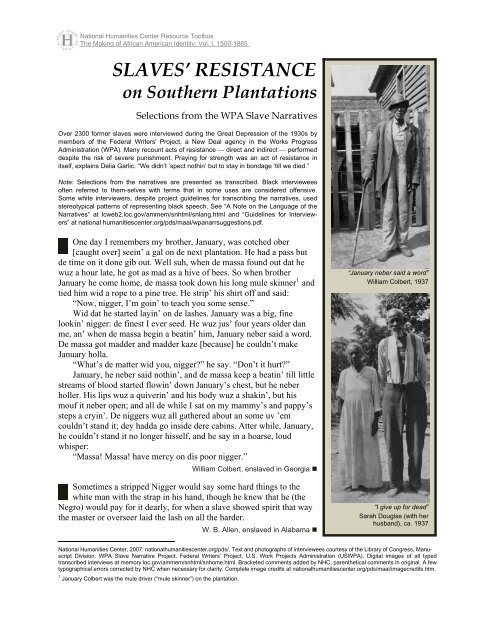
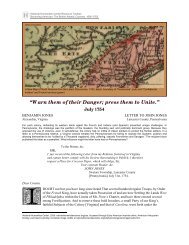
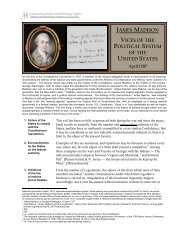
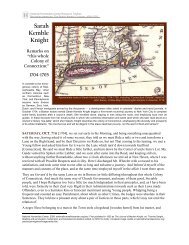
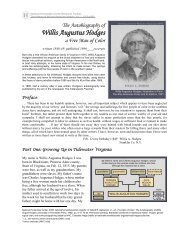
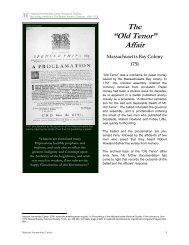
![The Requerimiento [Requirement], Council of Castile, 1510 ...](https://img.yumpu.com/21979685/1/190x245/the-requerimiento-requirement-council-of-castile-1510-.jpg?quality=85)
